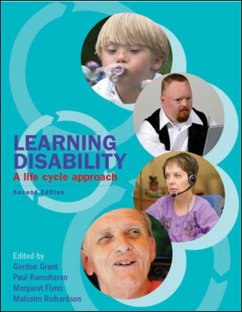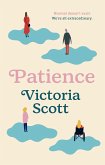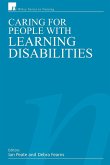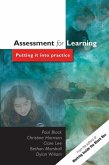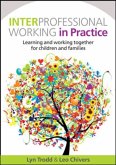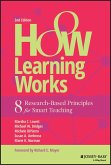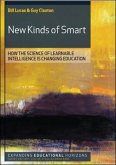Gordon Grant, Paul Ramcharan, Margaret Flynn
Learning Disability
Ed. by Grant, Gordon; Ramcharan, Paul; Flynn, Margaret
51,99 €
inkl. MwSt.
Versandkostenfrei*
Liefertermin unbestimmt
Melden Sie sich
hier
hier
für den Produktalarm an, um über die Verfügbarkeit des Produkts informiert zu werden.

26 °P sammeln
Gordon Grant, Paul Ramcharan, Margaret Flynn
Learning Disability
Ed. by Grant, Gordon; Ramcharan, Paul; Flynn, Margaret
- Broschiertes Buch
With its spread of chapters covering key issues across the life cycle this text has established itself as the foundational primer for those studying the lived experiences of people with learning disabilities and their families, and outcomes achieved through services and support systems.
Andere Kunden interessierten sich auch für
![Patience Patience]() Victoria ScottPatience18,99 €
Victoria ScottPatience18,99 €![Caring for People with Learning Caring for People with Learning]() Caring for People with Learning60,99 €
Caring for People with Learning60,99 €![Assessment for Learning Assessment for Learning]() Paul BlackAssessment for Learning45,99 €
Paul BlackAssessment for Learning45,99 €![Interprofessional Working in Practice: Learning and Working Together for Children and Families Interprofessional Working in Practice: Learning and Working Together for Children and Families]() Lyn TroddInterprofessional Working in Practice: Learning and Working Together for Children and Families39,99 €
Lyn TroddInterprofessional Working in Practice: Learning and Working Together for Children and Families39,99 €![How Learning Works How Learning Works]() Marsha C. Lovett (Carnegie-Mellon University, Pittsburgh, PA)How Learning Works47,99 €
Marsha C. Lovett (Carnegie-Mellon University, Pittsburgh, PA)How Learning Works47,99 €![Disability and Social Justice in Kenya Disability and Social Justice in Kenya]() Nina BermanDisability and Social Justice in Kenya46,99 €
Nina BermanDisability and Social Justice in Kenya46,99 €![New Kinds of Smart: How the Science of Learnable Intelligence Is Changing Education New Kinds of Smart: How the Science of Learnable Intelligence Is Changing Education]() Bill LucasNew Kinds of Smart: How the Science of Learnable Intelligence Is Changing Education40,99 €
Bill LucasNew Kinds of Smart: How the Science of Learnable Intelligence Is Changing Education40,99 €-
-
-
With its spread of chapters covering key issues across the life cycle this text has established itself as the foundational primer for those studying the lived experiences of people with learning disabilities and their families, and outcomes achieved through services and support systems.
Hinweis: Dieser Artikel kann nur an eine deutsche Lieferadresse ausgeliefert werden.
Hinweis: Dieser Artikel kann nur an eine deutsche Lieferadresse ausgeliefert werden.
Produktdetails
- Produktdetails
- Verlag: McGraw-Hill Higher Education / Open University Press
- 2. Aufl.
- Seitenzahl: 536
- Erscheinungstermin: 16. Mai 2010
- Englisch
- Abmessung: 245mm x 190mm x 30mm
- Gewicht: 1013g
- ISBN-13: 9780335238439
- ISBN-10: 0335238432
- Artikelnr.: 28170298
- Herstellerkennzeichnung
- Libri GmbH
- Europaallee 1
- 36244 Bad Hersfeld
- gpsr@libri.de
- Verlag: McGraw-Hill Higher Education / Open University Press
- 2. Aufl.
- Seitenzahl: 536
- Erscheinungstermin: 16. Mai 2010
- Englisch
- Abmessung: 245mm x 190mm x 30mm
- Gewicht: 1013g
- ISBN-13: 9780335238439
- ISBN-10: 0335238432
- Artikelnr.: 28170298
- Herstellerkennzeichnung
- Libri GmbH
- Europaallee 1
- 36244 Bad Hersfeld
- gpsr@libri.de
Gordon Grant is Emeritus Professor at the Centre for Health and Social Care Research, Sheffield Hallam University, UK. Paul Ramcharan is Co-ordinator of Research and Public Policy at the Australian Centre for Human Rights Education, RMIT University, Melbourne, Australia. Margaret Flynn is the Independent Chair of Lancashire County Council's Safeguarding Adults Board, a Senior Associate of CPEA Ltd., and a Director of Flynn and Eley Associates Ltd., UK. Malcolm Richardson is Principal Lecturer at Sheffield Hallam University, UK.
Introduction - why the life cycle?
Part 1 - The construction of learning disability
Narratives and people with learning disabilities
Social constructions and social models: Disability explained?
The roots of biomedical diagnosis
Learning disability and the law
Models of service delivery
Maintaining a commitment to quality
Advocacy, campaigning and people with learning difficulties
Part 2 - Childhood and early parenting
Children with learning disabilities talking about their everyday lives
Communication with children and young people
The importance of aetiology of intellectual disability
Breaking the news and early intervention
Addressing the physical and sensory needs of children with profound and multiple learning disabilities
Family care: Experiences and expectations
Part 3 - Adolescence and transitions to adulthood
Adolescents and younger adults: Narrative accounts
Transition: A moment of change
Safeguarding adults with learning disabilities against abuse
Promoting healthy lifestyles: Challenging behaviour
(Almost) everything you ever wanted to know about sexuality and learning disability but were always too afraid to ask
The sexual lives of women with learning disabilities
Supporting people with learning disabilities within the criminal justice system
Independence, reciprocity and resilience
Personalizing learning disability services
Part 4 - Adult identities and community inclusion
You have to prove yourself all the time: People with learning disabilities as parents
Promoting friendships and developing social networks
Enabling and supporting person-centred planning
Culture and ethnicity: Developing accessible and appropriate services for health and social care
Work, supported employment and leisure
Promoting healthy lifestyles: Mental health
Retrieving lost identities: Men with severe intellectual disabilities and mental health problems in long-term care
Engaging communities of interest
Part 5 - Experiences of ageing and end-of-life issues
A late picking: Narratives of older people with learning disabilities
Growing old: Adapting to change and realizing a sense of belonging, continuity and purpose
End-of-life issues
Healthy and successful ageing
Research and emancipation: Prospects and problems
Part 1 - The construction of learning disability
Narratives and people with learning disabilities
Social constructions and social models: Disability explained?
The roots of biomedical diagnosis
Learning disability and the law
Models of service delivery
Maintaining a commitment to quality
Advocacy, campaigning and people with learning difficulties
Part 2 - Childhood and early parenting
Children with learning disabilities talking about their everyday lives
Communication with children and young people
The importance of aetiology of intellectual disability
Breaking the news and early intervention
Addressing the physical and sensory needs of children with profound and multiple learning disabilities
Family care: Experiences and expectations
Part 3 - Adolescence and transitions to adulthood
Adolescents and younger adults: Narrative accounts
Transition: A moment of change
Safeguarding adults with learning disabilities against abuse
Promoting healthy lifestyles: Challenging behaviour
(Almost) everything you ever wanted to know about sexuality and learning disability but were always too afraid to ask
The sexual lives of women with learning disabilities
Supporting people with learning disabilities within the criminal justice system
Independence, reciprocity and resilience
Personalizing learning disability services
Part 4 - Adult identities and community inclusion
You have to prove yourself all the time: People with learning disabilities as parents
Promoting friendships and developing social networks
Enabling and supporting person-centred planning
Culture and ethnicity: Developing accessible and appropriate services for health and social care
Work, supported employment and leisure
Promoting healthy lifestyles: Mental health
Retrieving lost identities: Men with severe intellectual disabilities and mental health problems in long-term care
Engaging communities of interest
Part 5 - Experiences of ageing and end-of-life issues
A late picking: Narratives of older people with learning disabilities
Growing old: Adapting to change and realizing a sense of belonging, continuity and purpose
End-of-life issues
Healthy and successful ageing
Research and emancipation: Prospects and problems
Introduction - why the life cycle?
Part 1 - The construction of learning disability
Narratives and people with learning disabilities
Social constructions and social models: Disability explained?
The roots of biomedical diagnosis
Learning disability and the law
Models of service delivery
Maintaining a commitment to quality
Advocacy, campaigning and people with learning difficulties
Part 2 - Childhood and early parenting
Children with learning disabilities talking about their everyday lives
Communication with children and young people
The importance of aetiology of intellectual disability
Breaking the news and early intervention
Addressing the physical and sensory needs of children with profound and multiple learning disabilities
Family care: Experiences and expectations
Part 3 - Adolescence and transitions to adulthood
Adolescents and younger adults: Narrative accounts
Transition: A moment of change
Safeguarding adults with learning disabilities against abuse
Promoting healthy lifestyles: Challenging behaviour
(Almost) everything you ever wanted to know about sexuality and learning disability but were always too afraid to ask
The sexual lives of women with learning disabilities
Supporting people with learning disabilities within the criminal justice system
Independence, reciprocity and resilience
Personalizing learning disability services
Part 4 - Adult identities and community inclusion
You have to prove yourself all the time: People with learning disabilities as parents
Promoting friendships and developing social networks
Enabling and supporting person-centred planning
Culture and ethnicity: Developing accessible and appropriate services for health and social care
Work, supported employment and leisure
Promoting healthy lifestyles: Mental health
Retrieving lost identities: Men with severe intellectual disabilities and mental health problems in long-term care
Engaging communities of interest
Part 5 - Experiences of ageing and end-of-life issues
A late picking: Narratives of older people with learning disabilities
Growing old: Adapting to change and realizing a sense of belonging, continuity and purpose
End-of-life issues
Healthy and successful ageing
Research and emancipation: Prospects and problems
Part 1 - The construction of learning disability
Narratives and people with learning disabilities
Social constructions and social models: Disability explained?
The roots of biomedical diagnosis
Learning disability and the law
Models of service delivery
Maintaining a commitment to quality
Advocacy, campaigning and people with learning difficulties
Part 2 - Childhood and early parenting
Children with learning disabilities talking about their everyday lives
Communication with children and young people
The importance of aetiology of intellectual disability
Breaking the news and early intervention
Addressing the physical and sensory needs of children with profound and multiple learning disabilities
Family care: Experiences and expectations
Part 3 - Adolescence and transitions to adulthood
Adolescents and younger adults: Narrative accounts
Transition: A moment of change
Safeguarding adults with learning disabilities against abuse
Promoting healthy lifestyles: Challenging behaviour
(Almost) everything you ever wanted to know about sexuality and learning disability but were always too afraid to ask
The sexual lives of women with learning disabilities
Supporting people with learning disabilities within the criminal justice system
Independence, reciprocity and resilience
Personalizing learning disability services
Part 4 - Adult identities and community inclusion
You have to prove yourself all the time: People with learning disabilities as parents
Promoting friendships and developing social networks
Enabling and supporting person-centred planning
Culture and ethnicity: Developing accessible and appropriate services for health and social care
Work, supported employment and leisure
Promoting healthy lifestyles: Mental health
Retrieving lost identities: Men with severe intellectual disabilities and mental health problems in long-term care
Engaging communities of interest
Part 5 - Experiences of ageing and end-of-life issues
A late picking: Narratives of older people with learning disabilities
Growing old: Adapting to change and realizing a sense of belonging, continuity and purpose
End-of-life issues
Healthy and successful ageing
Research and emancipation: Prospects and problems
